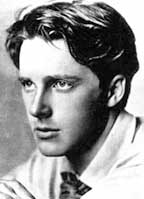

Rupert Brooke was born at Rugby, England, August 3, 1887. His father was the housemaster at School Field House, where Brooke was educated. He was popular due to his academic and atheletic ability, and his charm and good looks (WB Yeats later called him "the most handsome man in England.")
He travelled in Europe, where he wrote his Thesis, John Webster and the Elizabethan Drama. This work won him a fellowship at King's College, Cambridge in 1913. He counted as his friends Virginia Woolf, Edward Thomas, E.M. Forster and John Maynard Keynes. After writing his one-act play, Lithuania, he became a correspondant for the Westminster Gazette and travelled to North America and the South Seas.
In September, 1914, when Brooke was 27, he became a Sub-Lieutenant with the R.N.V.R.His major war experience comprised action with the Hood Battalion in the evacuation of Antwerp, October 1914.
He sailed with British Mediterranean Expeditionary Force on February 28, 1915; subsequently he died in the Aegean, April 23, 1915 from blood poisoning, on the way to the Gallipoli campaign.
As such, he never experienced the full brutality of twentieth-century warfare. "The Great War" (World War One) was distincitviely different than the preceding Boer War in South Africa, in which
Britain had also fought.
Brooke is considered by many to be a "pre-war poet," in that he expressed the (neo-Romantic) idealism of the generation of young men who went off to fight. Later poets, such as Siegfried Sassoon and Wilfred Owen expressed the reality of the horrors of war.
His death was on St. George's day (April 23rd, the traditional observance of Shakespeare's birth), and his obituary appeared in April 26, 1915 edition of The Times, written by Winston
Churchill, who was then First Lord of the Admiralty.
It was his death, perhaps, and the recognition of his peers that ganted him a mythical status - as Frances Cornford wrote of Brooke,
"A young Apollo, golden-haired,
Stands dreaming on the verge of strife,
Magnificently unprepared
For the long littleness of life."
His grave is on the island of Skyros, the most isolated of the Northern Sporades, in the Northern Aegean. The island is first mentioned by Homer, and is where Achilles hid until he was called up to fight in the Siege of Troy. In Brooke Square on the island lies his grave, along with the "statue of an ideal poet", funded by a Belgian businessman in 1931. The statue itself, however, is not a likeness of Brooke.
The Soldier
Click here for the Collected Poems Of Rupert Brooke
"Arrival," from Letters From America.
"New York," from Letters From America.
A letter to Edward Marsh
Obituary written by Winston Churchill